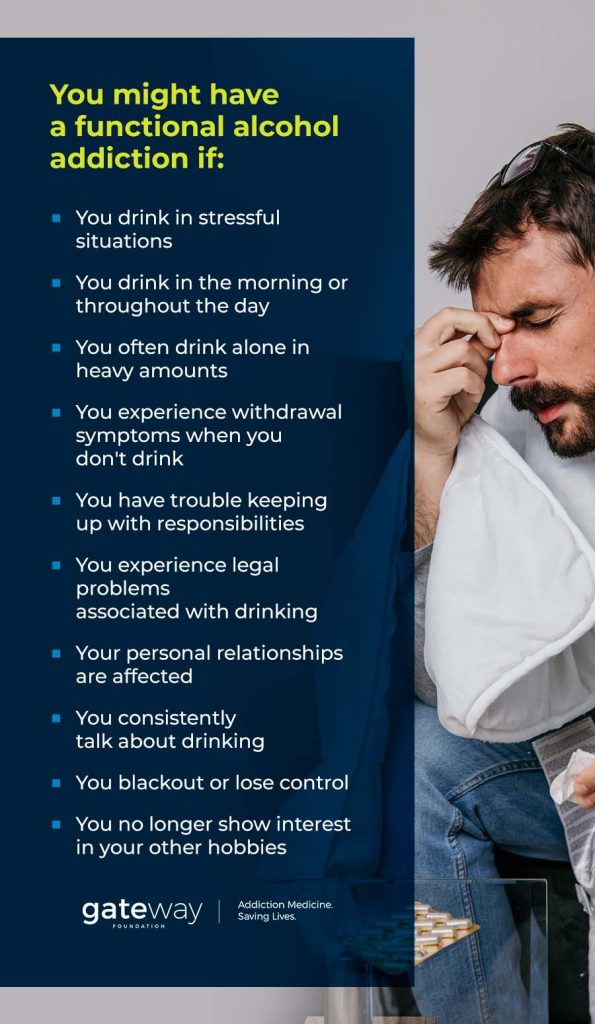- Dec 12
- Alcohol Addiction TreatmentRecovery
When we imagine someone with an alcohol use disorder (AUD), we often think of someone whose life has been seriously impacted by drinking. They get laid off from work, their relationships are strained or have ended, and their ability to function physiologically or in society has been significantly reduced. However, these ideas of alcohol addiction don’t apply to everyone.
Some people can manage to keep up with their job responsibilities, hold down a relationship and seem to function normally, despite drinking heavily. The ability to maintain appearances can make it challenging to spot an AUD and the need for an addiction treatment program.
What Is Functional Alcoholism?
People with a functional alcohol addiction can appear to function on the outside while they misuse alcohol in their private life. This is because they’ve built up a functional tolerance, which allows someone to consume alcohol and not appear intoxicated.
An AUD can affect people from all walks of life. People may start drinking for various reasons, such as stress or societal pressure. Once an AUD has developed, various aspects of their life are affected. It may be difficult for someone to engage with their loved ones, perform at their job and keep up with their responsibilities. This impairment is one of many criteria medical professionals use to diagnose an AUD.
However, some people don’t experience this impairment on the same level. They may be able to carry out daily tasks, such as paying bills, childcare, social activities and even work while under the influence of alcohol. This is what is referred to as a functional alcohol addiction.

Functional alcohol addictions can be difficult to spot for this reason. Friends and family members might not notice that a problem has developed until alcohol misuse becomes severe since many of the usual signs don’t manifest right away.
It’s important to note that functional alcohol addictions can devolve into a total dependency on alcohol and start to impact your personal and professional relationships. Even if you can manage your daily responsibilities, there’s no guarantee that it will stay that way forever, and continued use of alcohol only increases the chances of an AUD impacting every aspect of your life.
Signs You Might Be a Functioning Alcoholic
Heavy drinking is considered three drinks or more a day and seven or more a week for women, and four or more drinks a day and 14 or more a week for men. If you drink heavily or more than that, you may be at risk for developing an AUD.
Someone with a functioning alcohol addiction is also experiencing an AUD. Many of the signs of an AUD can be present in someone with a functional alcohol addiction, but they can be hard to spot. You might have a functional alcohol addiction if:
- You drink in stressful situations: Some people use alcohol to cope with stress in their life, hoping that it will bring them relief from their situation, whether that’s stress from work, relationships or finances. However, this is only a temporary attempt at a remedy and can cause additional stress down the line.
- You drink in the morning or throughout the day: Day drinking can be a factor of AUDs, especially if it has become a consistent behavior. Drinking at all times of the day can indicate that a dependency on alcohol has formed. To prevent withdrawal symptoms, someone might drink through the day. They may also make attempts to hide their drinking from friends and family.
- You often drink alone and in heavy amounts: People with an AUD may feel the need to drink by themselves due to a feeling of guilt or fear of judgment from their peers. Someone with a functioning alcohol addiction may drink during celebrations or at social events but continue to drink once they’ve returned home.
- You experience withdrawal symptoms when you don’t drink: Once a dependency on alcohol has been formed, the body will experience withdrawal symptoms when enough time has passed without the substance. Someone might drink more to prevent these uncomfortable symptoms.
- You have trouble keeping up with responsibilities: Someone who drinks may find it challenging to keep up with their responsibilities, such as taking care of the home or showing up to work on time. A person with a functional alcohol addiction will experience these difficulties, even if they don’t show it outwardly at first. The more you drink, the harder it will be to manage life’s responsibilities.
- You experience legal problems associated with drinking: There is a correlation between people who drink and crime. For instance, heavy drinkers are more likely to commit violent crimes, such as domestic abuse or assault. Someone who drinks frequently might also have a DUI on their record.
- Your personal relationships are affected: Someone with an AUD may try to hide their drinking, but friends and family are likely to notice if someone in their lives is drinking heavily, and they may try to confront this person. A person with a functioning alcohol addiction may deny their problem and resist care, which can push loved ones away.
- You consistently talk about drinking: People with an AUD may talk about drinking consistently. This can manifest in the form of frequent joking about drinking behaviors or talking about when they’re going to drink again.
- You blackout or lose control: Heavy drinking can cause blackouts or a loss of control, resulting in reckless decision-making, such as drinking and driving, unsafe sexual behavior or violent outbursts. You may wake up and not remember much from the night before.
- You no longer show interest in your other hobbies: A functioning alcohol addiction and an AUD alike can result in loss of hobbies or passions to make time for drinking.

Risks and Consequences of High-Functioning Alcoholism
When you drink alcohol, you’re putting yourself at risk, even if it seems like you can function normally while using alcohol. High-functioning alcohol addictions can develop into a more severe version with additional risks. Below are some of the main risks and consequences associated with functioning alcohol addictions.
Physical Health
Alcohol can have a significant impact on the body in numerous ways. When you drink a large amount for a long time, you put yourself at risk of developing serious health issues. Drinking alcohol affects your ability to move properly and think clearly. Long-term alcohol use can severely impact your kidneys, liver, heart and pancreas. Alcohol is also known to be carcinogenic.
Mental Health
Alcohol disrupts the brain’s ability to communicate with its various pathways. Someone who drinks may experience mood changes that can impact existing mental health conditions.
Some people turn to alcohol to try to cope with stress, anxiety and depression, which can result in a co-occurring disorder between alcohol addiction and other mental health concerns. Alcohol can then worsen the symptoms of these mental health conditions. Drinking doesn’t allow you to get to the underlying cause of mental health conditions and pushes the problem away rather than confronting it.
It’s also possible to experience post-alcohol depression or anxiety. A dependency on alcohol can also negatively affect your mental health when you can’t drink, leading to feelings of depression, anxiety and irritability.
Personal Relationships
Drinking can affect your personal relationships, even with a functioning alcohol addiction. The longer you drink, the more severe the effects on your relationships. Friends and family may confront you about your alcohol misuse, or they may feel forced to cover for you. Your loved ones may even urge you to seek help, which can be met with denial, especially if you have a functional alcohol addiction. The belief that a problem doesn’t exist makes you more resistant to care.
Consuming alcohol may lead to an increase in violent behaviors. It’s estimated that two-thirds of domestic violence cases involve alcohol in some form. Alcohol can create a dangerous environment for intimate partners and children in the home.
Professional Relationships
Someone with an AUD and a functioning alcohol addiction might attempt to drink while working. This can cause problems with concentration and productivity. Drinking outside of work can also cause consistent hangovers, resulting in irritability and lateness. All of these factors combined can make it challenging to perform as expected. In some cases, this can even result in job loss, causing financial strain. This added stress can further impact personal relationships and drive someone to drink even more.
Behavioral Changes
People who drink alcohol sometimes engage in risk-taking behaviors. Some of these behaviors include risky decision-making, such as excessive gambling or spending more money than you have. Some people might also choose to continue drinking once they’re intoxicated, despite having already consumed a heavy amount of alcohol. People are also more likely to engage in risky sexual behavior after they drink, creating the chance for an unplanned pregnancy or sexually transmitted diseases (STDs).
Some people take part in illegal activity when they drink. One of the common crimes that people commit when they drink is driving under the influence (DUI). People who drink and drive put themselves and everyone on the road with them in danger.

How to Get Help For Functional Alcohol Addition
Treatment is the best way to recover from an AUD and get your life back. The steps below will be your guide through the recovery process.
1. Acknowledge a Problem Exists
The first step to getting help is admitting that a problem exists. It can be tempting to remain in denial, especially with a functioning alcohol addiction. The problem can be harder to notice at first but may eventually evolve into something more serious. Talk with your doctor about your alcohol use and what treatments they recommend. They can offer you multiple treatment options to pick from based on your symptoms and individual needs.
2. Seek Help From a Treatment Center
AUDs can affect each person differently, and no single treatment will work for everybody. A specialized treatment center can offer you personalized care based on your individual needs and personal circumstances.
You’ll undergo a professional evaluation to help determine the level of care you require. A medical professional will ask you questions about your alcohol use, how it’s affecting your life and what symptoms you’re experiencing. Once they’ve determined the extent of your AUD, they can recommend a treatment plan to help facilitate a successful recovery.
Treatment centers offer different levels of inpatient and outpatient services to accommodate your individual needs. Some people may choose an intensive outpatient alcohol addiction program due to outside responsibilities, such as child care or school. Others may prefer an inpatient rehabilitation program to recover in a safe and sober environment.
3. Use a Detox Program
Detoxing from alcohol can seem like an overwhelming and uncomfortable process for some, and it turns a lot of people away from recovery. However, medication-assisted treatment (MAT) programs are designed to help you through detox. These medications can limit the intensity of your withdrawal symptoms and provide comfort and relief while you adjust to sobriety. During the detoxing process, you’ll be under 24/7 medical supervision so you can recover safely and in a sober environment.
4. Attend Therapy
Talking with a professional and other people who have gone through similar experiences is vital for the recovery process. Individual therapy can help you address the underlying causes of your AUD. In some cases, treatment will also address mental health conditions that may be one of the causes of alcohol misuse. Co-occurring conditions such as substance use and mental health disorders are common, and treating both at the same time in therapy can give you the best chance at recovery.
Through group and individual therapy, you’ll learn healthy coping mechanisms and skills to help you manage your triggers and adjust to sober living. You’ll also be able to connect with people who understand what you’re going through and create a support network that can help hold you accountable.
5. Commit to Aftercare
Once your treatment has ended, it’s essential to create a plan to manage your triggers and stress as you reenter society. A curated aftercare program can offer support long after you’ve finished your treatment.
You can also join self-help groups, such as Alcoholics Anonymous (AA), to meet with people from a similar background and seek support as you adjust back to independent living. A 12-step addiction treatment program can help you do the same, and you’ll meet at the treatment facility and in the community. Aftercare is essential to maintaining the skills learned during your recovery and for accountability.
Seek Recovery With Gateway Foundation
Getting help with an alcohol addiction is the best way to ensure a successful recovery. With over 50 years of experience, Gateway Foundation uses evidence-based treatments to facilitate high-quality care for all of our patients. We offer 24/7 support and personalized care so you can reclaim your life and be free from addiction.
We have facilities located across Illinois to help you find treatment close to home. You’ll work with our professional staff to curate a plan suited to your individual needs. Get in touch today to learn more about our alcohol addiction treatment programs and take the first step toward recovery.



